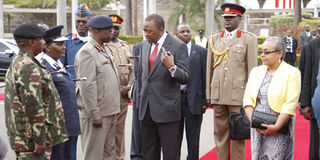Why elect a president and then deny him the powers to protect Kenyans?

President Uhuru Kenyatta has a word with the Inspector-General of Police, David Kimaiyo in this file photo. President Kenyatta is facing a daunting task in appointing the next police boss after URP politicians in Jubilee warned that any attempt to get Mr Kimaiyo’s replacement from outside the Rift Valley region would have serious consequences for the alliance. FILE PHOTO |
What you need to know:
- There is no alternative to fixing the police. In my opinion, police reforms have been a total failure.
- The law needs to be changed to restore the president’s authority to appoint the Inspector-General of police, the Director of CID and the Commandant of the GSU subject to parliamentary approval.
I have lost faith in police reforms.
I was monitoring the developing matatu crisis in Nairobi on Wednesday and was horrified at what I saw. I knew the city was in trouble at 6.30am.
It was curious, I thought, that there was no preventive police deployment. The reports I was getting from media were that matatus were blocking the road, but no police had arrived as yet.
Then it hit me. At around 7.15, I heard the traffic boss on radio, confirming that “we have heard” about the problem and officers were trying to get to the areas of blockage. The police were totally, absolutely, completely clueless. They were unprepared.
Then I saw the confrontation on Jogoo Road between three officers and matatu thugs. The thugs, dozens of them, had surrounded the officers and were advancing menacingly, chanting “ua! Ua! Ua!” (kill them! Kill them! Kill them!).
I was pleasantly surprised that the encounter ended without bloodshed. When the police lose authority and are under threat, the State itself loses authority and is under threat. For there can be no state without law and order.
It occurred to me that our Police Force is in complete tatters and that the security of our country is in mortal danger.
Had the National Intelligence Service, the Crime Intelligence Unit and the Criminal Investigations Department not warned the police that the matatu bandits intended to shut down the city?
It is not possible for disruption on that scale to be planned without the knowledge of law enforcers. Quite likely, the police were warned but did not take the matter seriously.
Police are more likely to notice something needs doing when a bribe is involved.
I got a call the other day from an old US Marine who has lived in Kenya for many years and reminded me, quite pointedly, that we Kenyans faced an existential threat from the extremists in Somalia and the many within our borders who have now been radicalised.
We run a daily danger of being blown up going to work, shopping or church. So why are Kenyans so unbothered, so unwilling to fight to stay alive?
I think it is because we have the naïve hope that somebody is taking care of things. It still hasn’t sunk that in matters security, where police are concerned, we are very close to being on our own.
In retrospect, I do not believe for a minute that the police did not receive information in advance from either foreign or local spooks that terrorists were looking to attack a shopping mall in Nairobi.
Their complaint that the information was “general” is like the excuses of a man who is offered food but declines to eat it because it does not have enough soup.
If information is general, I would imagine that the consumer tasks the provider to be more specific.
MILITARY DOING POLICE WORK
The sense I get is that Jubilee might be tempted to give up on the police. The National Police Service is an independent body, and really, the security of Kenyans is down to Inspector General Kimaiyo and Mr Kavuludi.
But the presidency cannot divorce itself from the security of Kenyans; that is its most important duty.
Nor can the government pretend that it can rely on the military to do police work. Soldiers are trained to kill, not to police.
There is no alternative to fixing the police. In my opinion, police reforms have been a total failure. They did not deliver the efficient, clean, civil and responsive Police Force we expected.
The very notion of a commander-in-chief who can’t command, hire and fire is ridiculous.
What is the point of electing a president but deny him the full authority to protect the lives and property of Kenyans? And if we distrust our politicians to the extent that we can’t depend on them to pick important people, why hire them in the first place?
In reforming the police, we did not cut the powers of the president as intended; we made the president very close to powerless. I think we should have the courage to admit that we bungled that particular job and give it another try.
The law needs to be changed to restore the president’s authority to appoint the Inspector-General of police, the Director of CID and the Commandant of the GSU subject to parliamentary approval.
The president should also have the authority to set performance targets for the same officers and to sack them if they don’t get the job done. On a day-to-day basis, they can get their orders from the DPP.
Reforms must deliver the goods. If they don’t, then we must reform the reforms.





